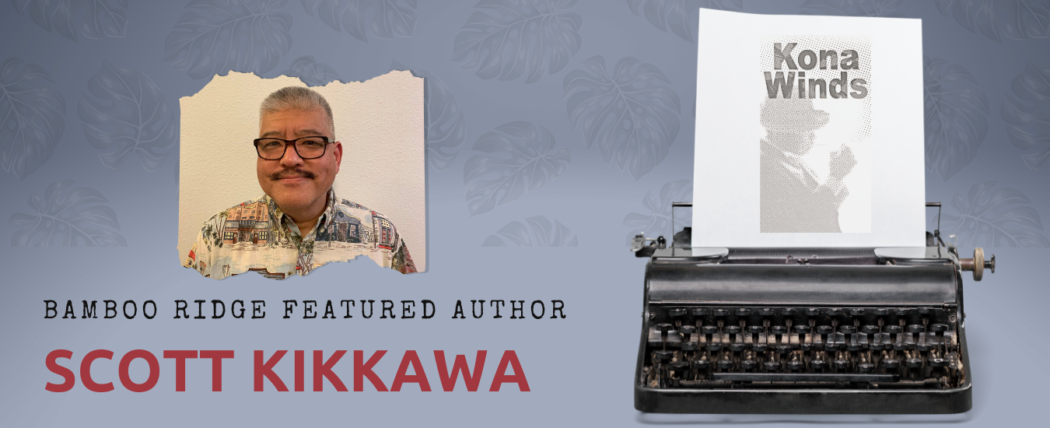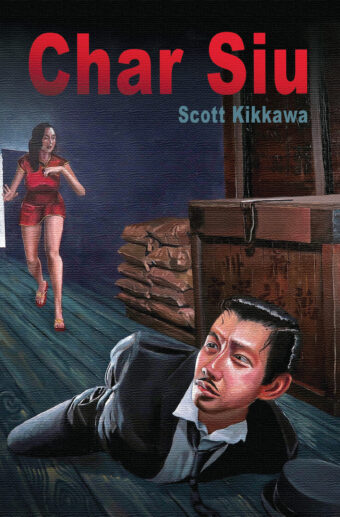Subtotal: $20.00
As an early standout of our Bamboo Shoots monthly writing contests, many of Scott Kikkawa’s entries were chosen for publication in our annual issues. His dark humor and descriptive scenes made him a captivating favorite at our reading events. When all of his stories eventually made up a novel the editors decided to publish it and in December of 2019 the 1950s noir, Kona Winds was released.
Sadly, due to COVID-19 most of Scott’s scheduled readings and appearances on the mainland and here at home were cancelled. He was very kind to record a reading for our Bamboo Ridge at Home video series and now we’re excited to have him as the first featured author to be interviewed on the new BR website! We asked, he answered (we put our money on the wrong fictional crime fighter) and the results are these…
How did publishing your first book change your process of writing?
Being published in particular by Bamboo Ridge changed my writing process a great deal. Writing was such a solitary, lonely process when I first started. Bamboo Ridge is not just my publisher, it’s my family. I think there are few presses, small or large, that inspire that kind of sentiment. I feel that I don’t write alone anymore. I have wonderful feedback and support from some of the greatest writers and editors anywhere, and the confidence they have given me has accelerated the process for me. Delays in creating for me are mostly caused by fear and doubt, and I have those moments much less frequently than I used to.
What were some of the challenges of writing a historical mystery set in 1950s Hawaiʻi? Why did you choose to set the book in this time period?
The biggest challenge of writing in the territorial period is that I never saw it; by the time I was born, it was gone. I did, however, see the last vestiges of that society when I was a child, and even those ghosts pretty much vanished by the time I was in college. I had to imagine buildings, institutions, businesses, neighborhoods and, most of all, people, as newer and younger.
I chose this period for a few pointed reasons.
First, I think Hawaiʻi’s territorial era is largely glossed over in popular references to Hawaiʻi history; in fact, as I learned it in the classroom, there was a kingdom until Queen Liliʻuokalani was deposed, then there’s a mention of Pearl Harbor and World War II, then we’re in a modern tourism economy. All those years of colonial conditions and labor strife barely get a mention. For those of us who are local but neither Native Hawaiian nor haole, the territorial years were our crucible of struggle. What could be more noir than pre-statehood 20th century Honolulu?
Second, I believe that there was a golden age of crime, and, consequently, of crime fiction, and that era is not today. There was a time when banks were robbed and people were killed for cash, when cases of mistaken identity were tragically frequent in an age before DNA, and cops beat confessions out of suspects without fear of lawsuits. It was an uglier time that spawned interesting stories. I am an actual law enforcement officer, and nothing is more mundane and pedestrian than law enforcement today. I can’t write in the contemporary period because I’d have to suspend my own disbelief too much to do so.
Third, I have an obsession aesthetically with the period. Both men and women never looked better: hats, gloves, coats, ties, hair, shoes, make-up. Smoking and drinking were never sexier. You could tell makes and models of cars apart by their silhouettes alone. Even the music was better dressed: Miles Davis, John Coltrane, Chet Baker, Frank Sinatra, Nat King Cole.
What kind of research do you do, and how long do you spend researching before beginning a book or story?
I love research and the many forms it takes. I peruse photographs at the State Archives, Bishop Museum and online. I am fortunate enough to have been given access to the Center for Labor Education and Research (CLEAR) at UH-West Oʻahu by Dr. Bill Puette. I talk to professors in the UH system who are friends of mine, and listen to my mother’s anecdotes of being a young person during the period. And I read, read, read. I have amassed a personal reference library on territorial Hawaiʻi with volumes on subjects ranging from World War II martial law to labor strikes to police memoirs. I spent a month or so researching before starting my manuscript and continued to research throughout the process of composition and revision. It never really stops.
Why do you think it is important to promote diversity in publishing with dynamic, complex, minority characters of color?
Many have probably said this, but I attribute this quote to Darrell Lum (via Joy Kobayashi-Cintron): you don’t really exist until you see yourself in literature.
The mystery genre, in particular the hardboiled/noir subgenre, has long been owned by the white guy featuring the angst and disillusionment of the loner detective. Anyone who lives here can tell you that lone wolf white guys do not have a monopoly on angst and disillusionment by a long shot.
Hawaiʻi has been the backdrop for a ton of mysteries, but the vast majority of the hundreds have featured white fish-out-of-water protagonists who come here and have a vacation filled with mischief and murder. In those stories, there are often local characters, but their role is the same as the mountains and the ocean: quaint scenery.
We’re more than props. We’re more than sidekicks.
People are obsessed with true crime. If you had to pick a true crime event in Hawaiʻi history (or history in general) to write about, what would it be?
There are a lot of true crime events in Hawaiʻi’s history that are worthy of a novel, from the unlawful overthrow of the monarchy to a certain police chief and his deputy prosecutor wife. But the one crime that has captured my imagination more than any other is the Massie/Kahahawai case. I don’t think I’d ever write about it, though: nobody will ever do it better than our Renshi Poets! I’ll stick to fake crimes.
Have you read anything that made you think differently about fiction? What is your favorite mystery novel or series?
I’ve read a great many things I’ve enjoyed over my lifetime from childhood until the present, but nothing spoke to me like the detective fiction of Raymond Chandler and Dashiell Hammett. Chandler raised the detective novel to literature with his lyricism and his introspective narrative, and Hammett’s dialogue and timing made me wish all conversations were that entertaining to listen to.
Walter Mosley first made me see that the cynical detective need not be white, and Naomi Hirahara’s Mas Arai was a revelation: it could be someone I know.
How do you select the names of your characters?
I selected period-sounding names, and many of the given names belonged to aunts, uncles, friends of my parents and other people I have known of that generation. It’s not hard, especially here in Hawaiʻi where people actually had names like Mildred, Violet, Wally, Francis and Ellen. And I actually knew those people, though most bear no likeness to their namesake characters.
Besides the clues in the plot do you hide any secrets in your books or stories for readers to find?
Anyone who knows me well will catch some references and in-jokes. Mostly, though, I’ll base fictitious characters, buildings and institutions on real-life ones, and I’ve always been curious to see if anyone figures out the inspiration for the creations.
If you could be any fictional detective, who would you be?
Sherlock Holmes. Deductive reasoning at lightning speed would save me a lot of time, money and embarrassment.
If Magnum P.I. got into a fight with Steve McGarrett, who would win? Which one is the better crime sleuth?
I’m not very familiar with the most recent incarnations of these characters, so I’ll go old school on you: Jack Lord would kick the crap out of Tom Selleck. Are you kidding me? Always put your money on the guy who smiles less. As for which one is a better sleuth: again, advantage McGarrett. As far as I know, he never drove from downtown to Waikīkī via Waimānalo.
As a writer, what would you choose as your mascot/avatar/spirit animal?
Howard the Duck. The comic book character, not the heinous 1986 movie based on it.
What was the hardest scene to write in Kona Winds?
None of them and all of them.
Mahalo Scott for answering our questions, both serious and silly! We look forward to reading more of your stories in the future.
*A product of Hawaiʻi Kai in East Honolulu, Scott Kikkawa is the author of noir detective stories set in postwar Honolulu featuring Detective Sergeant Francis “Sheik” Yoshikawa. His work has been published in BAMBOO RIDGE, JOURNAL OF HAWAIʻI LITERATURE AND ARTS. The New York University alumnus is currently a Federal law enforcement officer and lives with his family in Honolulu. KONA WINDS is his first full length novel.


 Kona Winds
Kona Winds 


Talk story